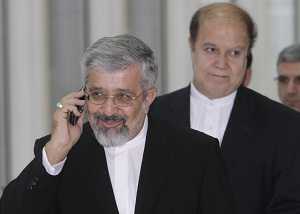Posted on by Laura Rozen
 Nuclear experts from Iran and six world powers head to Istanbul next week to discuss a revised international proposal that Iranian officials welcomed as a “turning point” at a meeting in Kazakhstan last month.
Nuclear experts from Iran and six world powers head to Istanbul next week to discuss a revised international proposal that Iranian officials welcomed as a “turning point” at a meeting in Kazakhstan last month.
The U.S. team to the Istanbul talks, to be held March 18, includes two veteran State Department arms control negotiators, Robert Einhorn and Jim Timbie, as well as Jofi Joseph, an Iran director in the White House WMD shop, US officials told the Back Channel Thursday. Einhorn and Timbie previously attended technical talks with Iran held in Istanbul last July, along with then White House WMD czar Gary Samore, who left the administration in January for Harvard.
Iran’s delegation to the technical talks in Istanbul next week is expected, as last July, to be led by Hamid-Reza Asgari, a longtime member of Iran’s nuclear negotiating team, who multiple Iranian sources tell Al-Monitor is an Iranian intelligence officer who has been involved in Iran’s international arms control discussions for over a decade. Iran’s team to Istanbul last July also included Ali Ashgar Soltanieh, Iran’s envoy to the International Atomic Energy Agency (IAEA).
(A revealing detail on their dynamic comes from a late 2009 US cable, released by Wikileaks, and written by then US envoy to the IAEA Glyn Davies. It describes Soltanieh as having moved to shake US Deputy Energy Secretary Dan Poneman’s hand at a 2009 Vienna meeting, “necessitating Iranian Legal Advisor Asgari to pull him [Soltanieh] away from” the U.S. delegation, Davies wrote.)
American and Iranian officials had fairly extensive discussions at the last technical meeting in Istanbul last July, a senior US official, speaking not for attribution, told journalists at P5+1 talks with Iran in Almaty, Kazakhstan last month.
“There’s a little heightened hope that Iran will respond in a meaningful way when they meet,” Mark Fitzpatrick, a former State Department arms control official now with the International Institute for Strategic Studies (IISS) in London, told the Back Channel Thursday. “If Iran comes back engaging in the details…if they are talking the same language…it would be very much progress.”
President Obama, speaking on Wednesday ahead of his first presidential trip to Israel next week, said that the United States currently assesses it would be at least a year before Iran could manufacture a nuclear weapon if it decided to do so, and the United States and international partners had been intensifying efforts to reach a diplomatic resolution in that window because it would prove more durable.
“Right now, we think it would take over a year or so for Iran to actually develop a nuclear weapon, but obviously we don’t want to cut it too close,” Obama told Israel’s Channel 2 Wednesday, the Associated Press reported.
“So when I’m consulting with [Israeli Prime Minister] Bibi [Netanyahu], my message to him will be the same as before,” Obama continued. “If we can resolve it diplomatically, that is a more lasting solution. But if not, I continue to keep all options on the table.”
Arms control experts said calculating such a time line involves a complicated set of likely and unlikely assumptions. “If Iran decided today to build nuclear weapons, it would require years, not weeks or months, to deploy a credible nuclear arsenal,” Greg Thielmann, a former US intelligence analyst now with the Arms Control Association, told the Back Channel Thursday.
The Istanbul experts level talks come as Iranian leaders have intensified debate on the pros and cons of direct talks with the United States in recent days, suggesting Tehran may be mulling whether to take President Obama up on the offer and under what conditions.
Iranian Supreme Leader Ayatollah Ali Khamenei’s official website this week posted previously unreleased photos of Iranian and American officials meeting in Iraq in 2007, as well as interviews with Iranian officials involved in the talks, Al-Monitor reported Thursday. Then US Ambassador to Iraq Ryan Crocker told Al-Monitor Friday that he found Tehran’s publication of the photos “interesting,” and said they were of meetings he attended in Iraq in 2007, when he served as the US envoy to Baghdad.
Two Iranian presidential candidates close to the Supreme Leader also weighed in on prospects for US-Iran talks in Iranian media interviews this week.
Ali Akbar Velayati, the Supreme Leader’s longtime foreign policy advisor and a former Iranian foreign minister, speaking to Iranian journalists Wednesday, “said that as long as Americans have not changed their behavior and methods of conduct with Iran, the stance of the Islamic Republic of Iran will remain unchanged,” the Islamic Republic News Agency (IRNA) reported Thursday.
But former Iranian nuclear negotiator Hassan Rowhani said there were situations when the Supreme Leader would endorse talks with the Americans, as he has on certain occasions in the past.
“It is not the Supreme Leader’s view that Iran and the United States should not have negotiations and relations until the Day of Judgment,” Rowhani, the Supreme Leader’s representative to the Iranian Supreme National Security Council, was cited by Iranian media Thursday.
“If there is a situation where the country’s dignity and interests are..served, he will give permission for dialogue…as…negotiations have been held between the two countries on issues related to Iraq, Afghanistan, and the nuclear (issue),” Rowhani continued.
(Hamid-Reza Asgari, top right, a senior advisor in Iran’s Atomic Energy Organization, is pictured with Iran’s envoy to the IAEA Ali Ashgar Soltanieh (left, with beard), attending a meeting in Vienna with French, Russian and American diplomats October 21, 2009. REUTERS/Herwig Prammer.)
Read more: http://backchannel.al-monitor.com/index.php/2013/03/4760/iran-p51-nuclear-experts-head-to-istanbul-technical-talks/#ixzz2Nios3vk4

Leave a Reply